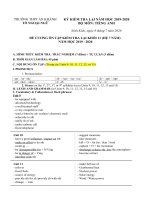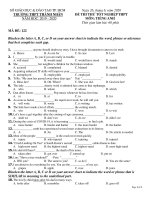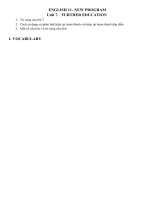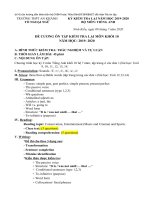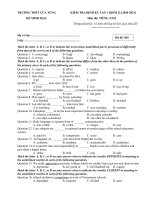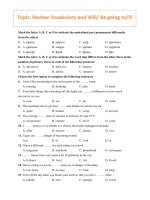- Trang chủ >>
- Khoa học tự nhiên >>
- Vật lý
DE THPT QG
Bạn đang xem bản rút gọn của tài liệu. Xem và tải ngay bản đầy đủ của tài liệu tại đây (61.21 KB, 6 trang )
<span class='text_page_counter'>(1)</span>MR. BEAN’S MATERIALS (Đề thi gồm: 06 trang). ĐỀ KTCL ÔN THI THPT QUỐC GIA NĂM 2016 Môn: TIẾNG ANH – ĐỀ SỐ 24 Thời gian làm bài: 90 phút, không kể thời gian phát đề. PHẦN TRẮC NGHIỆM: (8 điểm) Mark the letter A, B, C, or D on your answer sheet to indicate the word whose underlined part differs from the other three in pronunciation in each of the following questions. Question 1: A. agreed B. missed C. liked D. watched Question 2: A. educate B. eliminate C. certificate D. dedicate Mark the letter A, B, C, or D on your answer sheet to indicate the word that differs from the other three in the position of the primary stress in each of the following questions. Question 3: A. religious B. performance C. miserable D. including Question 4: A. decoration B. temperament C. opportunity D. expectation Question 5: A. cosmetics B. investment C. protection D. luxury Choose A, B, C, or D on your answer sheet to indicate the word or phrase CLOSEST in meaning to the underlined part in each of the following questions. Question 6: Biogas can be utilized for electricity production, cooking, space heating, water heating, and process heating. A. reformation B. sparing C. increase D. generation Question 7: American children customarily go trick-or-treating on Halloween. A. inevitably B. readily C. happily D. traditionally Question 8: “Edwards seems like a dog with two tails this morning”. Haven’t you heard the news? His wife gave birth to a baby boy early this morning” A. very proud B. exhausted C. extremely dazed D. extremely pleased Mark the letter A, B, C or D on your answer sheet to indicate the word(s) that is OPPOSITE in meaning to the underlined part in each of the following questions. Question 9: For most male spiders courtship is a perilous procedure, for they may be eaten by females. A. complicated B. dangerous C. safe D. peculiar Question 10: Names of people in the book were changed to preserve anonymity. A. reveal B. conserve C. presume D. cover Choose A, B, C, or D on your answer sheet to show the underlined part that needs correction. Question 11: Alaska’s vast areas of untamed wilderness attracts many people who enjoy the outdoors. A. wilderness B. untamed C. enjoy D. attracts Question 12: Manufacturers may use food additives for preserving, to color, or to flavor, or to fortify foods. A. to flavor B. fortify foods C. for preserving D. many use Question 13: Computer science which is considered by some scientists to have a much closer relationship with mathematics than many scientific disciplines. A. much closer B. than many C. which is considered D. some scientists Question 14: If one type of manufacturing expands, it is like that another type will shrink considerably. A. expands B. like C. another D. considerably Question 15: The Pullman strike of 1894 occurred took place during the era of rapid industrialization. A. place B. occurred took C. of rapid D. industrialization Mark the letter A, B, C, or D on your answer sheet to indicate the correct answer to each of the following questions. Question 16: He was determined to choose that university because of____________..
<span class='text_page_counter'>(2)</span> A. its reputation is fine B. its fine reputation C. it is fine D. it has a fine reputation Question 17: ____________, no one was absent from the farewell party last night. A. Heavily as it rained B. As it rained heavily C. Though it rains heavily D. In spite of the heavily rain Question 18: The spy admitted____________ some highly secret information to enemy agents. A. to have given B. having been given C. to have been given D. having given Question 19: The teacher asked students to discuss the situation: “Which is better, supermarkets or traditional markets?” Choose the most suitable response to fill in the blank in the following exchange. Jennifer: “I believe that supermarkets are much better than traditional markets.” Katherine: “____________. Each has its own features.” A. I couldn’t agree with you more. B. That’s completely true. C. I disagree with you. D. I can’t help thinking the same. Question 20: When it started to snow, he____________ his overcoat. A. took out B. put off C. took off D. put on Question 21: We are going to have a trip to Hanoi Capital. We need to____________ arrangements for the trip carefully. A. do B. make C. get D. pay Question 22: Nobody knows why____________ until next week. A. did the meeting postpone B. the meeting was postponed C. was the meeting postponed D. the meeting postponed Question 23: A____________ is money that is paid by a government or other authority in order to help an industry or business, or to pay for a public service. A. subsidy B. capital C. investment D. salary Question 24: The picture ____________ was beautiful. A. she was looking B. at which she was looking C. at it she was looking D. at that she was looking Question 25: ____________ that we had to ask a police officer for directions. A. So confusing was the map B. was so confusing the map C. The map was so confusing D. Such confusing was the map Question 26: By the end of this year, Chen____________ English for three years, but he will still need more training and experience before he masters the language. A. will have been studying B. has been studying C. has studied D. will be studying Question 27: It is necessary that a life-guard____________ the summing pool while the children are taking their swimming lessons. A. monitored B. monitors C. monitor D. monitoring Question 28: I don’t think Peter will come with us, ____________? A. do I B. don’t I C. won’t he D. will he Question 29: George wouldn't have met Mary____________ to his brother’s graduation party. A. hadn't he gone B. had he not gone C. if he has not gone D. if he should not have gone Question 30: Eileen and Bernadette are dancing at the discotheque. Choose the most suitable response to fill in the blank in the following exchange. Eileen: You’re a great dancer. I wish I could do half as well as you. Bernadette: ______________. I'm an awful dancer! A. That's a nice compliment! B. You've got to be kidding! C. Oh, thank you very much. D. You're too kind. Question 31: ________the issue was debated, the more people became involved. A. The more longer B. The longer C. The longest D. The long Question 32: ____________ she was brought up. A. It is Paris where B. It was Paris, where.
<span class='text_page_counter'>(3)</span> C. It is in Paris, which D. It is in Paris that Question 33: This morning I bought____________ newspaper and a magazine. The newspaper is in my bag but I don't know where____________ magazine is. A. a/ a B. a/ the C. the/ the D. the/ a Question 34: She has just bought____________. A. a reddish impressive wood French coffee table B. an impressive reddish French wood coffee table C. an impressive French reddish wood table coffee D. an impressive French wood reddish coffee table Read the following passage and mark the letter A, B, C, or D on your answer sheet to indicate the correct answer to each of the questions. ACADEMICS AREN’T THE PROBLEM Studies about how students use their time might shed light on whether they face increased academic and financial pressures compared with earlier eras. Based on data about how students are spending time, academic or financial pressures don’t seem to be greater now than a generation ago. The data show that full-time students in all types of colleges study much less now than they did a generation ago - a full 10 hours a week less. Students are also receiving significantly higher grades. So it appears that academic pressures are, in fact, considerably lower than they used to be. The time-use data don’t suggest that students feel greater financial pressures, either. When the time savings and lower opportunity costs are factored in, college appears less expensive for most students than it was in the 1960s. And though there are now full-time students working to pay while in college, they study less even when paid work choices are held constantly. In other words, full-time students do not appear to be studying less in order to work more. They appear to be studying less and spending the extra time on leisure activities or fun. It seems hard to imagine that students feeling increased financial pressures would respond by taking more leisure. Based on how students are spending their time then, it doesn’t look as though academic or financial pressures are greater now than a generation ago. The time-use data don’t speak directly to social pressures, and it may well be that these have become more intense lately. In one recent set of data, students reported spending more than 23 hours per week either socializing with friends or playing on the computer for fun. Social activities, in person or on computer, would seem to have become the major focus of campus life. It is hard to tell what kinds of pressures would be associated with this change. Question 35: The study’s conclusion that students’ workload now is not greater than before is based on_____________. A. what students achieve with greater load B. how students spend their time C. how students work through college D. what college demands from students Question 36: Research studies have shown that pressures put on students nowadays are_____________. A. not greater than the past B. getting ever greater C. much greater than the past D. more diversified Question 37: Students get higher grades as_____________. A. students study much harder B. academic workload appears more attractive C. academic workload appears less demanding D. college’s facilities are much better Question 38: According to the author, the fact that students have more time for leisure is a proof that_____________. A. financial pressure on students is not a problem B. academic work disinterests them C. they are active with extra-curricular activities D. they cannot find extra jobs Question 39: All factors considered, college now seems_____________. A. more costly B. ever more expensive C. much more expensive D. less expensive.
<span class='text_page_counter'>(4)</span> Question 40: According to the author, the fact that more full-time students are working for pay________. A. does not change students’ campus life B. indicates that students are academically pressured C. is not an indication of pressures D. shows that students are financially pressured Question 41: Students nowadays seem to be studying less and_____________. A. spending more time on leisure B. spending more time doing odd jobs C. giving more time to sports D. taking more extracurricular activities Question 42: The word “focus” in the last paragraph can be replaced with__________. A. central activity B. primary theme C. headline D. biggest importance Question 43: The author finds it hard to point out___________. A. how students’ campus life becomes subject to academic pressure B. what is associated with the change in students’ campus life C. the cause to students’ financial pressure D. how the background of students’ campus life is built Question 44: The word “Academics” in the title mostly means___________ A. students’ workload in college B. college students and tutors C. professors and research students D. graduate students’ workload Read the following passage and mark the letter A, B, C, or D on your answer sheet to indicate the correct word for each of the blanks. We are using up the world’s petroleum. We use (45)___________ in our cars and to heat our building in winter. Farmers use petrochemicals to (46)___________ the soil rich. They use them to kill insects (47)___________ eat plants. These chemicals go (48)___________ rivers and lakes and kill the fish there. Thousands of pollutants also go into the air and pollute it. Winds carry this (49)___________ air to other countries and other continents. Poor farmers use the same land over and (50)___________ The land needs a rest so it will be better next year. However, the farmers must have food this year. Poor people cut down forests (51)___________ firewood. In some areas when the trees are gone, the land (52)___________ desert. Poor people can’t save the environment for the (53)___________. This is not a problem for one country or one area of the world. It is a problem for all- humans. The people and the nations of the world must work together to (54)___________ the world’s resources. Question 45: A. it Question 46: A. work Question 47: A. what Question 48: A. out Question 49: A. pollute Question 50: A. over Question 51: A. of Question 52: A. gets Question 53: A. future Question 54: A. recycle. B. them B. change B. who B. for B. polluting B. again B. for B. changes B. time being B. preserve. C. that D. those C. make D. let C. whom D. which C. at D. into C. polluted D. pollution C. repeatedly D. repeating C. with D. at C. turns D. becomes C. times D. period C. keep D. reuse. Read the following passage and mark the letter A, B, C, or D on your answer sheet to indicate the correct answer to each of the questions that follow. Jazz has been called “the art of expression set to music”, and “America’s great contribution to music”. It has functioned as popular art and enjoyed periods of fairly widespread public response, in the “jazz age” of the 1920s, in the “swing era” of the late 1930s and in the peak popularity of modern jazz in the late 1950s. The standard legend about Jazz is that it originated around the end of the 19th century in New Orleans and moved up the Mississippi River to Memphis, St. Louis, and finally to Chicago. It welded together the elements of Ragtime, marching band music, and the Blues. However, the influences of what led to those early sounds goes back to tribal African drum beats and European.
<span class='text_page_counter'>(5)</span> musical structures. Buddy Bolden, a New Orleans barber and cornet player, is generally considered to have been the first real Jazz musician, around 1891. What made Jazz significantly different from the other earlier forms of music was the use of improvisation. Jazz displayed a break from traditional music where composers wrote an entire piece of music on paper, leaving the musicians to break their backs playing exactly what was written on the score. In a Jazz piece, however, the song is simply a starting point, or sort of skeletal guide for the Jazz musicians to improvise around. Actually, many of the early Jazz musicians were bad sight readers and some couldn’t even read music at all. Generally speaking, these early musicians couldn’t make very much money and were stuck working menial jobs to make a living. The second wave of New Orleans Jazz musicians included such memorable players as Joe Oliver, Kid Ory, and Jelly Roll Morton. These men formed small bands and took the music of earlier musicians, improved its complexity, and gained greater success. This music is known as “hot Jazz” due to the enormously fast speeds and rhythmic drive. A young cornet player by the name of Louis Armstrong was discovered by Joe Oliver in New Orleans. He soon grew up to become one of the greatest and most successful musicians of all time, and later one of the biggest stars in the world. The impact of Armstrong and other talented early Jazz musicians changed the way we look at music. Question 55: The Passage answers which of the following questions? A. Why did Ragtime, marching band music, and the Blues lose popularity after about 1900? B. What were the origins of Jazz and how did it differ from other forms of music? C. What has been the greatest contribution of cornet players to music in the twentieth century? D. Which early Jazz musicians most influenced the development of Blues music? Question 56: According to the passage, Jazz originated in_____________. A. the Mississippi river B. St. Louis C. Chicago D. New Orleans Question 57: Which of the following distinguished Jazz as a new form of musical expression? A. the use of cornets B. “hot Jazz” C. improvisation D. New Orleans Question 58: The word “skeletal” in paragraph 2is closest in meaning to_____________. A. framework B. musical C. basic D. essential Question 59: Which of the following can be inferred from the passage? A. many early Jazz musicians had poor sight B. there is no slow music in Jazz C. many early Jazz musicians had little formal musical training D. the cornet is the most common musical instrument used in Jazz Question 60: The word “menial” in paragraph 2 is closest in meaning to_____________. A. mens B. attractive C. degrading D. skilled Question 61: According to the passage, which of the following belonged to the second wave of New Orleans Jazz musicians? A. Louis Armstrong B. Buddy Bolden C. St. Louis D. Joe Oliver Question 62: All of the following are true EXCEPT_____________. A. the late 1930s was called the “swing era” B. “hot Jazz” is rhythmic C. Jazz has been said to be America’s greatest contribution to music D. Joe Oliver is generally considered to be the first real Jazz musician Question 63: The word “its” in paragraph 2 refers to_____________. A. small bands B. earlier music C. men D. earlier musicians Question 64: The word “their” in paragraph 2 refers to which of the following? A. composers B. musicians C. pieces D. earlier forms II. PHẦN VIẾT (2 điểm) Part I: Finish each of the following sentences in such a way that it means the same as the sentence printed before it..
<span class='text_page_counter'>(6)</span> Question 1: Although I love him, I can’t tolerate his impatience. → Much _______________________________________________________________________. Question 2: Would you mind not smoking in here? → I’d ___________________________________________________________________________. Question 3: John missed the ferry because he got up late. → If ____________________________________________________________________________. Question 4: “Don’t forget to check the internet for an application to our college,” the counselor told the students. → The counselor reminded _________________________________________________. Question 5: People say that nine crew members were lost overboard. → Nine crew members ______________________________________________________. Part II: Paragraph writing: With around 140 words, write to talk about the integration of the mass media to people’s modern life. The following suggestions may be of some help to your arguments: - The mass media affect us positively. - The mass media affect us negatively. - The mass media are important to our life after all. -------------------THE END-----------------.
<span class='text_page_counter'>(7)</span>




